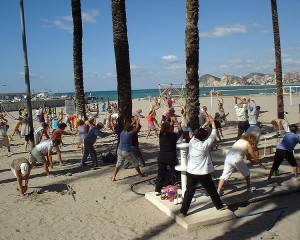 The popular press has a wealth of information on fitness. But if you are over 50, your reading will often leave you feeling confused or unsure. This is because so many studies focus on younger people and you know better than to generalize. Good health and fitness guidance for a 12-year-old might not true for a 30-year-old, and what is true for a 30-year-old might not be true for a 60-year-old.
The popular press has a wealth of information on fitness. But if you are over 50, your reading will often leave you feeling confused or unsure. This is because so many studies focus on younger people and you know better than to generalize. Good health and fitness guidance for a 12-year-old might not true for a 30-year-old, and what is true for a 30-year-old might not be true for a 60-year-old.
So we perk up when research has findings with specific implications for middle-aged and older folks. A recent bit of research from UCLA doesn’t specifically address the olds, but it has implications for them. As the authors put it, “Our results raise the possibility that scheduled exercise could be used as a tool to modulate daily rhythms and…may counteract some of the negative impacts of ageing and disease on the circadian system.”
The study looked at how exercise affected the daily (also called circadian) rhythms of mice. These rhythms affect your heart, liver and brain, according to Gretchen Reynolds’ recap of the study in the New York Times. Also—and this seems especially important for seniors—they influence sleep patterns.
If you are older than 50, you have probably noticed some change in sleep patterns. As we noted earlier, some of the reasons for this have been identified, but much of it is a great mystery.
The UCLA study suggests that exercise is a useful tool for regulating rhythms, including sleep. And this is the part that relates most directly to you, older runner/biker/skier: “the effect may be most beneficial if the exercise is undertaken midday.”
Also this, if you find that the evening is the only time you can fit in a trip to the gym: unpublished results “show that healthy mice running at the animal equivalent of 11 p.m. or so developed significant disruptions in their circadian rhythm. Among other effects, they slept poorly.”
Seems clear enough, so let’s muddy the issue: other studies have zeroed in on late afternoon as the ideal time for a workout, although the effects are slight and the body shows some ability to adjust to whatever schedule works for you.
Photo: Exercising at Benidorm (Spain) beach, 2009. By ClemMcGann, via Wikimedia Commons.









